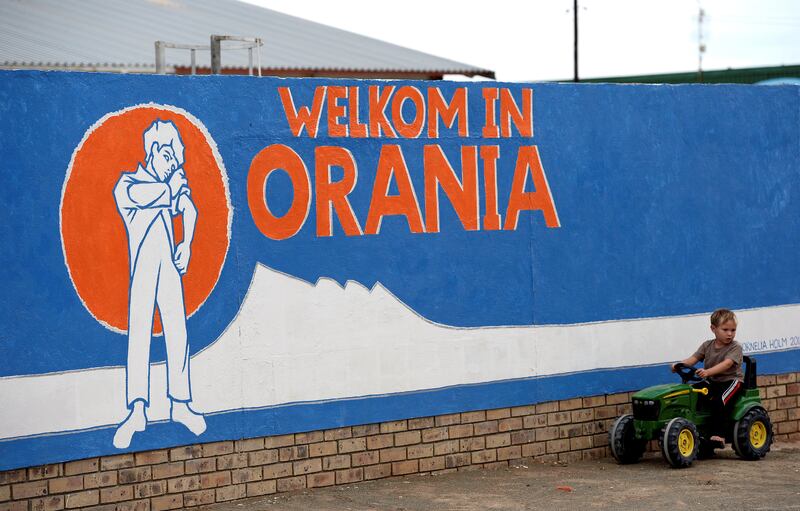The small town of Orania in central South Africa is a curious social experiment – a whites-only enclave in the middle of the multi-ethnic country.
Soon, Orania will have its own digital currency as part of its bid run as an independent community.
Orania was established in the arid Karoo region in the early 1990s, during the waning years of apartheid and open exclusively to white Afrikaans people. Although part of multicultural South Africa, it manages to retain its racial exclusivity because the town is technically all on private land. As a result, the governing trust gets to say who can move in, and who cannot. Today, around 1,200 burgers are permanent residents.
Although often derided and mocked in media as the "Amish of South Africa", Orania has embraced technology – it was one of the earliest adopters of digital homeschooling, for instance. Now it plans its own cryptocurrency in an experiment that economists say is one of the first of its kind anywhere in the world.
"Orania has had its own physical currency since 2004, the ora," says Pieter Krige, the chairman of the Orania chamber of business, which administers the monetary unit. "We're simply digitising what is already an established physical unit of exchange."
The ora is in reality a voucher printed by the business chamber. Legally Orania cannot produce a currency as this is the domain of the South African Reserve Bank.
The ora voucher itself is backed by the South African currency the rand – for every unit in circulation, one rand is deposited in the chambers' bank account. These banked rands earn interest, which is then used as income for the chamber and Orania as a whole.
________________
Read more:
[ Bitcoin, blockchain and boom-and-bust economies ]
[ Bitcoin tumbles as Chinese online exchange halts trades ]
________________
The vouchers have been successful in that residents are happy to use them, but clearly come with a limitation: they require a physical transaction. This is where the cryptocurrency version will come in.
"The geographic limits of a physical note are eliminated, and its digitalisation will smooth transactions," Mr Krige says. Keeping rands in the bank ensures the ora's value remains in parity with the official currency and does not suffer inflation.
Cryptocurrencies such as the granddaddy of them all, Bitcoin, are now all the rage in South Africa. The country's own currency continues to do poorly against international benchmarks, much of this the result of unfortunate economic decisions made by the administration of the president Jacob Zuma.
South Africa also has stringent foreign exchange laws that make moving and holding foreign currency tricky. The result has been a surge in interest in digital money that can be stored away from official eyes and moved offshore in a blink.
Even the country's reserve bank is considering issuing a cryptocurrency of its own, better to understand the emerging trend to e-currencies. "We are willing to consider the merits and risks of blockchain technology and other distributed ledgers," the bank's governor, Lesetja Kganyago said last year.
Blockchain technology acts as a digital distributed ledger to confirm batches of transactions for the likes of Bitcoin and other cryptocurrency technologies.
Data from CryptoCompare puts the market cap of South African Bitcoin holdings at just over US$70 million compared with a total global market cap of $70 billion. About $4,000 in value is traded daily in South Africa.
However, it is the Orania experiment that has captured attention. This will be one of the first community focused initiatives, and it could shape the evolution of cryptocurrencies worldwide, says Dawie Roodt, the chief economist at the Efficient Group in Johannesburg.
Mr Roodt has taken something of a professional risk by setting up a study of the Orania currency; usually, any association with the community and its apartheid style set-up would be career suicide. Mr Roodt, though, feels that the benefits a community-based digital currency can deliver are worth taking a chance over.
"This is a revolution of sorts. If a private currency becomes established, we no longer need banks – and I suspect bankers themselves will disappear," Mr Roodt says.
Transaction costs using these currencies are lower than conventional electronic cash such as debit and credit cards. With this inducement, public support will most likely follow.
Mr Roodt imagines a time when communities – whether social, ethnic or even corporate will form around cryptocurrencies. Industries could set up their digital wallets and buy and sell from each other without having to incur bank charges. Currency communities could even spring up around social activities using platforms such as Facebook.
Of course, there will also be tears shed as people rush headlong into products that they do n ot understand. Worldwide cryptocurrencies are being created at a dizzying rate. It is likely many will fail.
"There is a lot of hype around digital currency right now. With so many being created right now there are bound to be failures. A lot of people are going to lose money," Mr Roodt says.
It is way too early to see whether Orania's next experiment in its long and controversial existence will succeed. Mr Roodt, however, is along for the ride. He is preparing a thesis on the ora and believes it will be a literal text-book case of how digital currencies can liberate – or beggar – consumers of the future.
"This is really exciting stuff – we are seeing the future happen now in front of us," he says.





